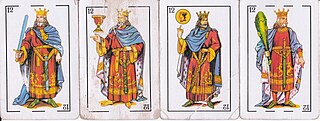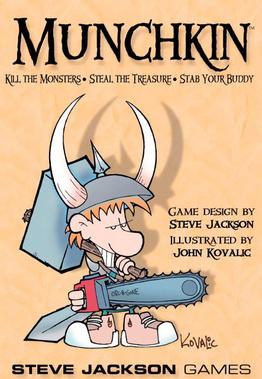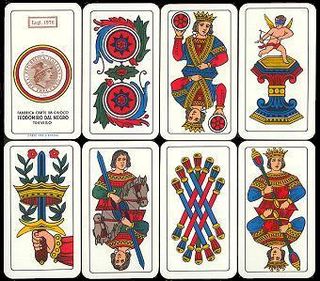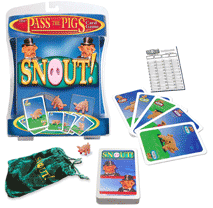
Blackjack is a casino banking game. It is the most widely played casino banking game in the world. It uses decks of 52 cards and descends from a global family of casino banking games known as "twenty-one". This family of card games also includes the European games vingt-et-un and pontoon, and the Russian game Ochko. The game is a comparing card game where players compete against the dealer, rather than each other.

Pinochle, also called pinocle or penuchle, is a trick-taking ace–ten card game, typically for two to four players and played with a 48-card deck. It is derived from the card game bezique; players score points by trick-taking and also by forming combinations of characters into melds. It is thus considered part of a "trick-and-meld" category which also includes the game belote. Each hand is played in three phases: bidding, melds, and tricks. The standard game today is called "partnership auction pinochle".

A trick-taking game is a card or tile-based game in which play of a hand centers on a series of finite rounds or units of play, called tricks, which are each evaluated to determine a winner or taker of that trick. The object of such games then may be closely tied to the number of tricks taken, as in plain-trick games such as contract bridge, whist, and spades, or to the value of the cards contained in taken tricks, as in point-trick games such as pinochle, the tarot family, briscola, and most evasion games like hearts. Trick-and-draw games are trick-taking games in which the players can fill up their hands after each trick. In most variants, players are free to play any card into a trick in the first phase of the game, but must follow suit as soon as the stock is depleted. Trick-avoidance games like reversis or polignac are those in which the aim is to avoid taking some or all tricks.

Baccarat or baccara is a card game played at casinos. It is a comparing card game played between two hands, the "player" and the "banker". Each baccarat coup has three possible outcomes: "player", "banker", and "tie".

Escoba is a Spanish variant of the Italian fishing card game Scopa, which means "broom", a name that refers to the situation in the game where all of the cards from the board are "swept" in one turn. The game is usually played with a deck of traditional Spanish playing cards, called naipes.

Munchkin is a dedicated deck card game by Steve Jackson Games, written by Steve Jackson and illustrated by John Kovalic. It is a humorous take on role-playing games, based on the concept of munchkins.

Evo: The Last Gasp of the Dinosaurs is a German-style board game for three to five players, designed by Philippe Keyaerts and published by Eurogames. The game won the GAMES Magazine award for Game of the year 2002. It was nominated for the Origins Award for Best Graphic Presentation of a Board Game 2000. In 2004 it was nominated for the Hra Roku. The game went out of print in 2007, and a second edition was released in 2011.
Pedro is an American trick-taking card game of the all fours family based on auction pitch. Its most popular variant is known as cinch, double Pedro or high five which was developed in Denver, Colorado, around 1885 and soon regarded as the most important American member of the all fours family. Although it went out of fashion with the rise of auction bridge, it is still widely played on the western coast of the United States and in its southern states, being the dominant game in some locations in Louisiana. Forms of the game have been reported from Nicaragua, the Azores, Niobe NY, Italy, and Finland. The game is primarily played by four players in fixed partnerships, but can also be played by 2–6 individual players.

Briscola is one of Italy's most popular games, together with Scopa and Tressette. A little-changed descendant of Brusquembille, the ancestor of briscan and bezique, Briscola is a Mediterranean trick-taking ace–ten card game for two to six players, played with a standard Italian 40-card deck.

Truco, a variant of Truc, is a trick-taking card game originally from Valencia and the Balearic Islands, popular in South America and Italy. It is usually played using a Spanish deck. Two people may play, or two teams of two or three players each.
Pitch is an American trick-taking game equivalent to the British blind all fours which, in turn, is derived from the classic all fours. Historically, pitch started as "blind all fours", a very simple all fours variant that is still played in England as a pub game. The modern game involving a bidding phase and setting back a party's score if the bid is not reached came up in the middle of the 19th century and is more precisely known as auction pitch or setback.
Sueca is a 4 player-partnership point trick-taking card game of the ace–ten family, and a popular variant of the Bisca card game. The game is played in Portugal, Brazil, Angola and other Portuguese communities. Its closest relative is the very similar German game Einwerfen.

Tressette or Tresette is a 40-card, trick-taking card game. It is one of Italy's major national card games, together with Scopa and Briscola. It is also popular in the regions that were once controlled by the Italian predecessor states, such as Albania, Montenegro, coastal Slovenia and coastal Croatia. It is also played in the Canton of Ticino with a French-suited deck. The Austrian game Trischettn as historically played in South Tyrol is also a derivative, albeit played with a 32-card German-suited deck.

Twilight Struggle: The Cold War, 1945–1989 is a board game for two players, published by GMT Games in 2005. Players are the United States and Soviet Union contesting each other's influence on the world map by using cards that correspond to historical events. The first game designed by Ananda Gupta and Jason Matthews, they intended it to be a quick-playing alternative to more complex card-driven wargames.

Snout! is a variation on the classic dice game Pass the Pigs. Unlike the original, players earn points by discarding cards in their hand matching what was rolled and getting rid of all cards in their hand, rather than matching what they rolled to a point chart. It was published by Winning Moves Games USA in 2005 but is no longer in production.

Race for the Galaxy (RftG), or simply Race, is a card game designed by Thomas Lehmann. It was released in 2007 by Rio Grande Games. Its theme is to build galactic civilizations via game cards that represent worlds or technical and social developments. It accommodates two to four players by default although expansions allow for up to six players, as well as solo play. The game uses iconography in place of language in some places, with complex powers also having a text description. While appreciated by experienced players for being concise, some new players find the icons difficult to learn and to decipher.

Commerce is an 18th-century gambling French card game akin to Thirty-one and perhaps ancestral to Whisky Poker and Stop the Bus. It aggregates a variety of games with the same game mechanics. Trade and Barter, the English equivalent, has the same combinations, but a different way of acquiring them. Trentuno, Trent-et-Uno, applies basically to the same method of play, but also has slightly different combinations. Its rules are recorded as early as 1769.

Cabo is a 2010 card game by Melissa Limes and Mandy Henning that involves memory and manipulation based on the classic Golf card game and is similar to Rat-a-Tat Cat (1995). The game uses a dedicated deck of cards with each suit numbered from 0 to 13, and certain numbers being marked as "Peek", "Spy" or "Swap". The objective of the game is for each player to minimize the sum of their own cards, four of which are played face-down to the table at the start of a round. Face-down cards may be revealed and swapped by card effects.
Cuttle is a two player card game played with a standard deck of 52 playing cards and is the earliest example of a combat card game. The game's earliest confirmed appearance took place in the 1970s, though the exact date of its creation is unknown.

Boon is a trick-taking card game, based on the German card game Sheepshead. It was released in 2015. Though the rules of Boon are analogous to those in the game Sheepshead, Boon uses a specialized deck which corresponds directly to the rules of the game. This is different than Sheepshead, which is played with 32 cards from the Standard 52-card deck. Boon can be played with three or four players.















